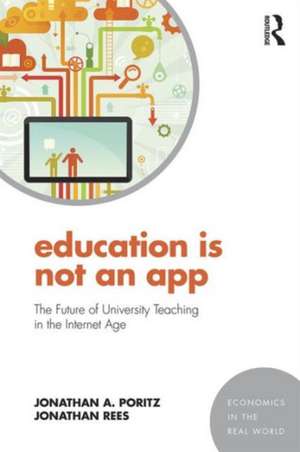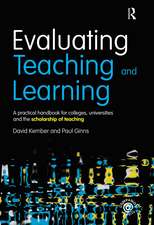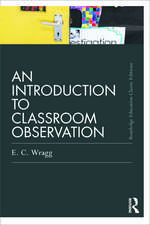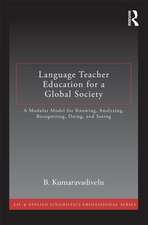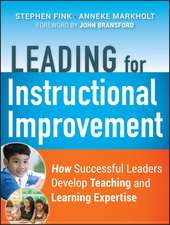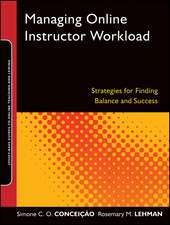Education Is Not an App: The future of university teaching in the Internet age: Economics in the Real World
Autor Jonathan A. Poritz, Jonathan Reesen Limba Engleză Paperback – 8 aug 2016
Education Is Not an App offers a bold and provocative analysis of the economic context within which educational technology is being implemented, not least the financial problems currently facing higher education institutions around the world. The book emphasizes the issue of control as being a key factor in whether educational technology is used for good purposes or bad purposes, arguing that technology has great potential if placed in caring hands. Whilst it is a guide to the newest developments in education technology, it is also a book for those faculty, technology professionals, and higher education policy-makers who want to understand the economic and pedagogical impact of technology on professors and students. It advocates a path into the future based on faculty autonomy, shared governance, and concentration on the university’s traditional role of promoting the common good.
Offering the first critical, in-depth assessment of the political economy of education technology, this book will serve as an invaluable guide to concerned faculty, as well as to anyone with an interest in the future of higher education.
| Toate formatele și edițiile | Preț | Express |
|---|---|---|
| Paperback (1) | 286.42 lei 3-5 săpt. | +13.93 lei 5-11 zile |
| Taylor & Francis – 8 aug 2016 | 286.42 lei 3-5 săpt. | +13.93 lei 5-11 zile |
| Hardback (1) | 1108.37 lei 6-8 săpt. | |
| Taylor & Francis – 8 aug 2016 | 1108.37 lei 6-8 săpt. |
Preț: 286.42 lei
Nou
Puncte Express: 430
Preț estimativ în valută:
54.82€ • 59.57$ • 46.08£
54.82€ • 59.57$ • 46.08£
Carte disponibilă
Livrare economică 31 martie-14 aprilie
Livrare express 15-21 martie pentru 23.92 lei
Preluare comenzi: 021 569.72.76
Specificații
ISBN-13: 9781138910416
ISBN-10: 1138910414
Pagini: 144
Dimensiuni: 156 x 234 x 13 mm
Greutate: 0.23 kg
Ediția:1
Editura: Taylor & Francis
Colecția Routledge
Seria Economics in the Real World
Locul publicării:Oxford, United Kingdom
ISBN-10: 1138910414
Pagini: 144
Dimensiuni: 156 x 234 x 13 mm
Greutate: 0.23 kg
Ediția:1
Editura: Taylor & Francis
Colecția Routledge
Seria Economics in the Real World
Locul publicării:Oxford, United Kingdom
Public țintă
Postgraduate and UndergraduateCuprins
Contents
Preface
Chapter 1. Introduction
Chapter 2. Online Education: The Good, the Bad and the Ugly
Chapter 3. MOOCs
Chapter 4. Free/Libre/Open-Source Edtech
Chapter 5. Unbundling
Chapter 6. Electronic Taylorism
Chapter 7. Social Media in the Classroom and Out
Chapter 8. The Zero-Marginal-Cost Education
Chapter 9. Conclusion: Higher Education in a Digital Age
Appendix: Jonathans’ Laws
Bibliography
Index
Preface
Chapter 1. Introduction
Chapter 2. Online Education: The Good, the Bad and the Ugly
Chapter 3. MOOCs
Chapter 4. Free/Libre/Open-Source Edtech
Chapter 5. Unbundling
Chapter 6. Electronic Taylorism
Chapter 7. Social Media in the Classroom and Out
Chapter 8. The Zero-Marginal-Cost Education
Chapter 9. Conclusion: Higher Education in a Digital Age
Appendix: Jonathans’ Laws
Bibliography
Index
Notă biografică
Jonathan A. Poritz is Associate Professor of Mathematics at Colorado State University-Pueblo, USA.
Jonathan Rees is Professor of History at Colorado State University-Pueblo, USA.
Jonathan Rees is Professor of History at Colorado State University-Pueblo, USA.
Recenzii
'This is a timely, and essential, book. The authors avoid the common trap of being firmly in a pro- or anti- technology camps and instead view the application of educational technology through a political economy lens. Your classrooms are no longer solely your own, they argue. Educational technology, often driven by Silicon Valley ideology, has particular aims in education. Examining the claims made and the implications for all educators allows us to make informed decisions. The control of education is at stake, and this book sets out the key areas with clarity and passion.' — Martin Weller, Professor of Educational Technology, The Open University, UK
‘Digital technologies can expand or contract freedom for faculty and students, depending on who's making the decisions. In Education is Not an App, Poritz and Rees describe both the threat and the opportunity, and issue a clear call for faculty control of our new digital tools.’
— Clay Shirky, Professor of Social Media, New York University, USA
'This book captures the frustration of many faculty who are witnessing the decline of faculty governance against the rise of administrative fiat, particularly in areas that impact pedagogical choice. In seven main chapters, the authors provide a detailed view of the systems and decisions that are so often thrust upon faculty. They do a superb job describing the landscape of MOOCs, FLOSS, and LMS in everyday language.'
-Joanne Maguire Robinson, Reflective Teaching
‘Digital technologies can expand or contract freedom for faculty and students, depending on who's making the decisions. In Education is Not an App, Poritz and Rees describe both the threat and the opportunity, and issue a clear call for faculty control of our new digital tools.’
— Clay Shirky, Professor of Social Media, New York University, USA
'This book captures the frustration of many faculty who are witnessing the decline of faculty governance against the rise of administrative fiat, particularly in areas that impact pedagogical choice. In seven main chapters, the authors provide a detailed view of the systems and decisions that are so often thrust upon faculty. They do a superb job describing the landscape of MOOCs, FLOSS, and LMS in everyday language.'
-Joanne Maguire Robinson, Reflective Teaching
Descriere
Whilst much has been written about the doors that technology can open for students, less has been said about its impact on teachers and professors. Although technology undoubtedly brings with it huge opportunities within higher education, there is also the fear that it will have a negative effect both on faculty and on teaching standards. Education Is Not an App offers a bold and provocative analysis of the economic context within which educational technology is being implemented, not least the financial problems currently facing higher education institutions around the world.
